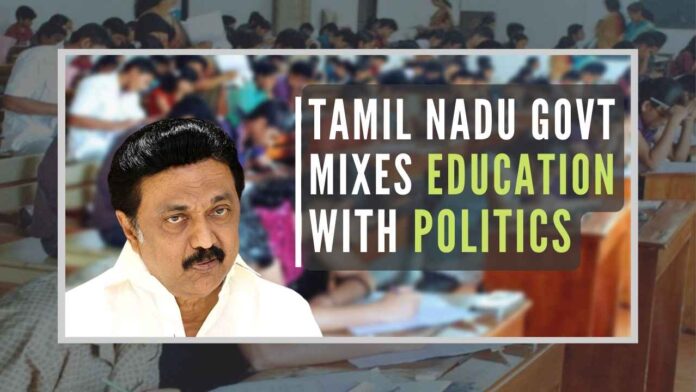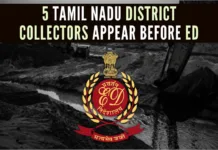
Tamil Nadu Govt plays politics in the field of education
The present ruling party in Tamil Nadu is unique, in that it has made it a policy to oppose every move and decision of the Central government in the guise of protecting the interest of the Tamil population, even without caring to examine the merits of the Central government’s stand. Further, it is trying to interpret any move of the Central government, as if it is against the interests of the Tamil population living in the state. In short, the government is exploiting the Tamil language for its political gains. This is so obvious now that it cannot be concealed anymore.
One section of Tamil Nadu which has been severely affected by such a policy of hate practiced by the Tamil Nadu government against the Central government is the student community in the state, particularly the poor students in the formative age group studying in government schools.
The Tamil Nadu government is now making so much noise opposing the NEET examination, though a considerable section of the population in the state recognizes that NEET is a non-issue. The fear psychosis being created by the state government, that the poor students particularly those living in rural areas would be adversely affected due to NEET examination by being denied admission in medical colleges, has been proved wrong, as several students from poor families and rural areas have passed NEET examination and got admission in medical colleges. But, the ruling party is ignoring this ground reality as it does not benefit its political objective.
Now, the latest weapon that the Tamil Nadu government has taken is to oppose the Common University Entrance Test (CUET), which is being conducted by the Central government for admission of students to central universities. The fact is that there is only one central university in Tamil Nadu which has been conducting such examinations for the last several years. Students writing this examination from Tamil Nadu can also get admission in other states. How is the interest of Tamil Nadu students affected by this? Such opposition by the Tamil Nadu government is not based on any reasoning but is only to spite the Central government.
The Central government is conducting Navodaya schools all over India and it is widely recognized that the fees are lower and the standard of education is reasonably good. But, the Tamil Nadu government would not permit Navodaya schools in the state because it is the Central government project and three language formula is adopted.
Tamil Nadu government is obsessed with two language formula, which means that only Tamil and English language would be taught in the government schools. Tamil Nadu government is vehemently opposing the new education policy of the Central government, which involves three-language formula, with one being the mother tongue, the other being English and the third one being any language as per the choice of the student.
Tamil Nadu government is insisting on two language policy, thinking that this would prevent students in the state from learning Hindi. The students studying in the government schools are severely affected by the two language formula, as they do not have the opportunity to learn a third language like Hindi, which would enable them to take up jobs outside Tamil Nadu.
There are now 37579 government schools in Tamil Nadu where mostly the poor students study. At present, 1,28,55,485 students study in the government schools. These poor students are mostly affected by this policy.
While the students in government schools cannot learn Hindi, the students in the private schools which are 12382 in Tamil Nadu have the opportunity to learn Hindi, and CBSE schools also have three language formula. Further, while the poor students cannot afford to get Hindi language proficiency by attending classes outside the school, the students belonging to middle and upper-income groups learn Hindi even if their schools would not teach them.
What is extremely disturbing is that while lakhs of poor students studying in the government schools are denied the opportunity to learn Hindi, the sons, daughters, relatives of ministers, bureaucrats, and government officials do not send their children to government schools but only to private schools, where three language formula is adopted. Even more shocking fact is that several ruling party men and relatives of ministers own schools where three language formula is followed.
Another recent counterproductive move of the Tamil Nadu government is to appoint vice-chancellors directly by the government and withdraw the powers of the state governor to function as chancellor and select vice-chancellors. Before the present Governor assumed office in Tamil Nadu, there were many allegations of vice-chancellors being appointed by demanding bribes by the ruling party men and unbending vice-chancellors being forced to face false charges so that they would be humiliated.
The government schools in Tamil Nadu are poorly managed with standards of education imparted to the students remaining unsatisfactory. We often hear about government school teachers going on strike and that some male teachers even misbehave with the girl students. Even disturbing news appears in the media of some teachers coming to the government school in drunken conditions.
Instead of reforming the government schools and helping the poor students to get quality education and improve their prospects, the Tamil Nadu government is playing politics in the field of education.
The ruling party in Tamil Nadu appears to have a vicarious view that anyone who loves the Tamil language should simultaneously hate the Hindi language. The ruling party’s preoccupation with hate feelings against Hindi and the Central government will have the ultimate effect of harming the interest of the poor students in the state and driving the state of Tamil Nadu’s education towards a bottomless pit.
What is noteworthy is that whether it is about opposing the NEET exam or CUET exam or the three-language formula, no state in the country adopts a negative stand as the Tamil Nadu government is now doing.
It is already seen that many poor students from Tamil Nadu are unable to compete at the All India level for jobs and they are forced to isolate themselves within the state.
Tamil Nadu government’s approach to the field of education in the state is like cutting the nose to spite the face.
Note:
1. Text in Blue points to additional data on the topic.
2. The views expressed here are those of the author and do not necessarily represent or reflect the views of PGurus.
PGurus is now on Telegram. Click here to join our channel and stay updated with all the latest news and views
For all the latest updates, download PGurus App.











[…] source […]